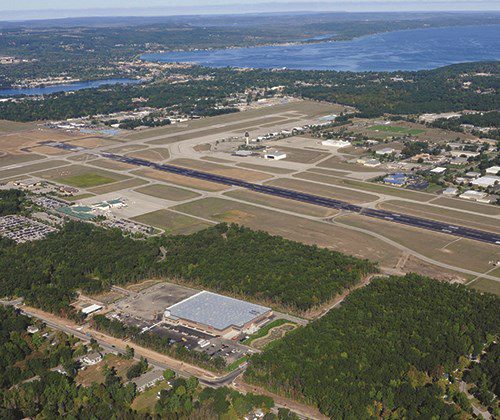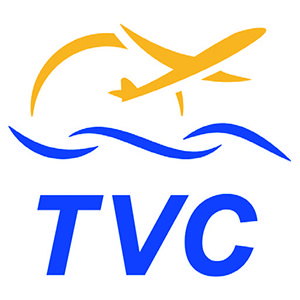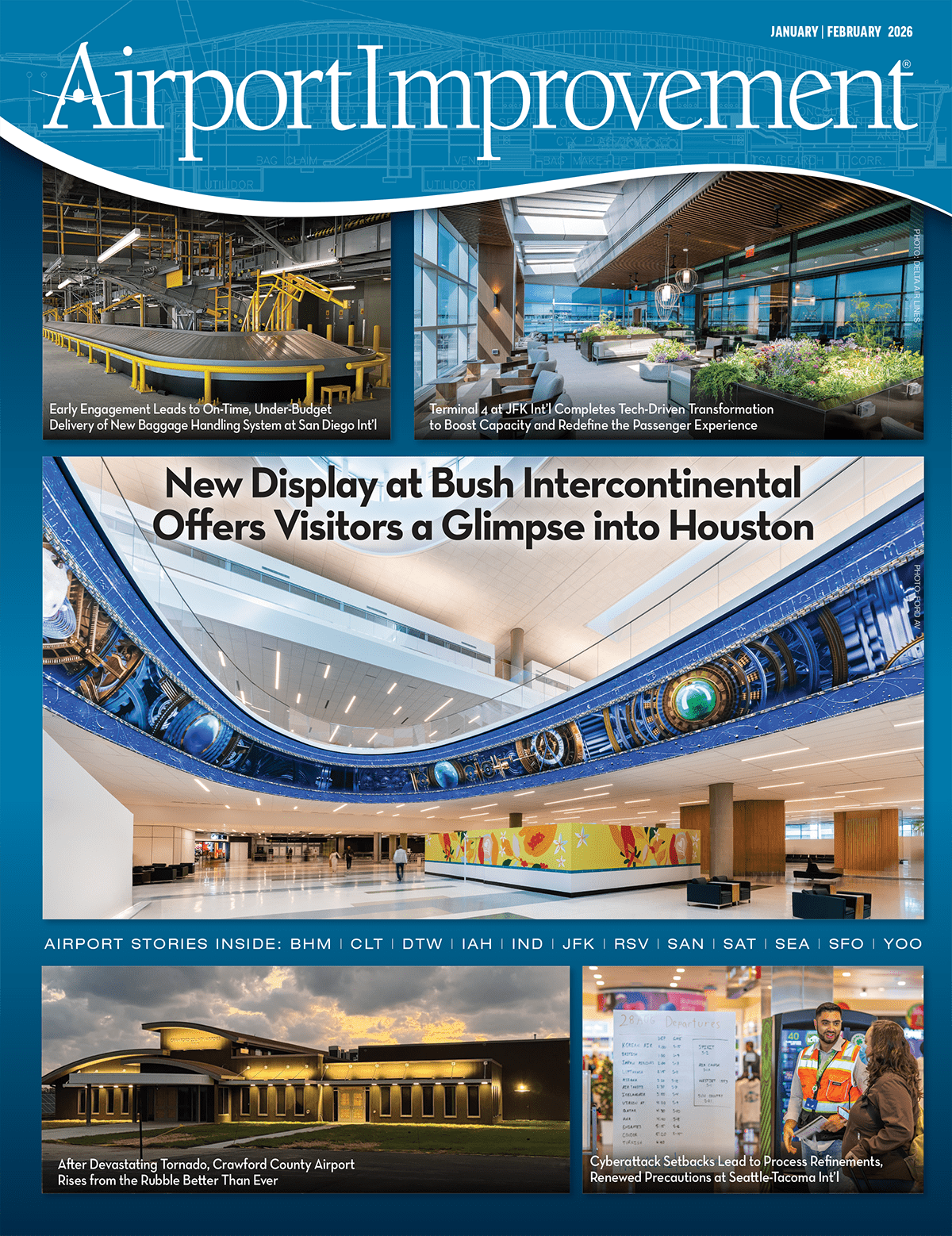When Costco Wholesale Corp. came knocking at Cherry Capital Airport (TVC), it took four years for the local airport commission to open the door. The warehouse giant wanted to build its first store in western Michigan on land at the Traverse City airport, but red tape made it a long process.
When Costco Wholesale Corp. came knocking at Cherry Capital Airport (TVC), it took four years for the local airport commission to open the door. The warehouse giant wanted to build its first store in western Michigan on land at the Traverse City airport, but red tape made it a long process.
Costco approached TVC in 2013 after a nearby site from another landowner didn’t pan out. The members-only retailer wanted to lease a high-profile, 20-acre parcel designated for non-aeronautical use. The transaction with the airport commission eventually happened and TVC gained a new $167,000 per year revenue stream, but it took 10 different governmental agencies to approve the land lease. The fastest approval came from the FAA, and that took 11 months, notes Chief Executive Officer Kevin C. Klein, A.A.E.
After the lucrative 60-year deal with Costco was sealed, Klein knew things had to change. The airport was actively marketing 70 more acres for additional non-aeronautical development, and he wanted there to be fewer speed bumps for potential tenants.
|
Project: Ownership & Governance Change Location: Cherry Capital Airport—Traverse City, MI 2020 Passenger Volume: 602,626 total passengers (record high) Scheduled Carriers: Allegiant; American Airlines; Delta Air Lines; United Airlines Previous Status: Since 1990, airport had been owned by 2 local counties & operated by their bi-county commission Current Status: Owned & operated by airport authority with 9-member board that includes 5 community representatives Official Changeover: Oct. 2021 Consultant for Governance/Ownership Change: Steven Baldwin Associates Air Service Development Consultants: Mead & Hunt, assisted by The Boyd Group
Current Capital Project: Parking Lot Expansion Scope: Adding 424 spaces to 1,000-spot lot Cost: $2.1 million Engineer: Prein & Newhof General Contractor: Elmer’s Crane & Dozer Construction: Nov. 2021 – June 2022
Current Development Project: New Hangar Owner: Avflight Size: 15,000 sq. ft. Status: Construction began in April 2022 Future Capital Project: Terminal Expansion Phase 1: 5 additional gates Projected Cost: $100 million Phase 2: 5 more new gates Projected Cost: $120 million Engineer: Mead & Hunt Anticipated Construction: 2025 |
“We realized that the commission structure hindered our way of doing business in an efficient manner,” he explains.
So TVC changed its stripes. And its new ownership and governance structure—an airport authority—is proving to be much more nimble at facilitating infrastructure improvement projects.
The Backstory
Since 1990, a bi-county commission of representatives from Grand Traverse and Leelanau counties had managed TVC. (The airport is located in Grand Traverse County; Leelanau is next door.) The two counties owned the 1,100-acre airport, but Traverse City, which owned TVC until 1974, still had a stake in controlling the land.
That all changed last fall. Now, TVC is owned and managed by the Northwest Regional Airport Authority. The two counties and the city no longer have a voice in—or veto power over—airport operations, lease agreements, air service development or capital projects. A nine-member board composed of four elected officials and five community representatives governs the new airport authority and makes such decisions.
Further Back
In 2015, the Michigan legislature passed the Regional Airport Authority Act to facilitate the conversion of Gerald R. Ford International Airport (GRR) in Grand Rapids from a commission governance structure to an airport authority. When lawmakers crafted the bill, they did so with an eye on helping other airports make similar changes.
Previously, state legislation for airport authorities was limited and did not easily allow for the creation of airport authorities. In fact, it had only allowed Detroit Metropolitan Airport to make such a switch. Any other airport needed to secure new legislation from the state.
When Klein and other officials decided they wanted to explore the possibility of changing TVC’s ownership and governance, they hired Steven Baldwin Associates to consult and help write the associated business plan. Firm principal Steven Baldwin had advised GRR and the state aviation board on the same matter just a few years before.
Ultimately, TVC became the second airport to leverage the new state law. Moreover, it was the first to also transfer ownership of the associated land. In GRR’s case, the county retained ownership of the airport land and only the management changed.
Steven Baldwin Associates’ services at TVC included a two-year study to assess the potential benefits and disadvantages of an ownership and governance change. In the midst of the study, it became apparent that TVC was already operating as if it were an authority.
“We were self-sufficient and stand-alone,” Klein explains, noting that neither county provided taxpayer funds to support airport operations or capital projects.
“One of the advantages of a commission is the shared resources of the host counties,” he adds. “In our case, they were not doing that.”
Case in point: TVC did not rely on either county to provide support services, such as human resources and IT. All 26 airport staff members were commission employees, not county employees. The city did provide police and fire coverage for the airport on a contract basis and continues to do so despite the recent ownership and governance change.
Currently, TVC, its airlines and other tenants have 400 direct employees and another 2,000 indirect employees. The airport’s annual economic impact in 2019 was estimated at $1 billion.
 The conclusion of the study by Steven Baldwin Associates indicated that it was no longer advantageous for TVC to be managed by the two-country commission. Subsequent dealings with Costco further validated the need for change. While developing the lease agreement, it became apparent that the airport’s 1990-era governance was not compatible with associated current FAA grant requirements. Klein notes that at a minimum, the commission’s bylaws would have needed to change to help facilitate funding for the important development.
The conclusion of the study by Steven Baldwin Associates indicated that it was no longer advantageous for TVC to be managed by the two-country commission. Subsequent dealings with Costco further validated the need for change. While developing the lease agreement, it became apparent that the airport’s 1990-era governance was not compatible with associated current FAA grant requirements. Klein notes that at a minimum, the commission’s bylaws would have needed to change to help facilitate funding for the important development.
Airport leadership consequently spent two years and held more than 10 public hearings with various surrounding governments to make sure the recommended change was the appropriate step. Baldwin says that gathering consensus typically doesn’t take so long, but COVID-related governmental shutdowns and associated limitations on public meetings slowed the pace.
After the consultant’s two-year study and nearly two years of vetting the concept with stakeholders, TVC’s ownership and governance change officially took effect in October 2021.
New Power, New People
With its new governance, the airport was required to establish a zoning board. State law empowers the authority to control all of its property without oversight of the local planning and zoning authorities.
The airport consequently created a seven-member zoning board. Four members also serve on the authority board; the other three are planners from key local communities. That trio will now have an important voice in shaping airport development, Klein points out.
The new zoning board became effective this past February and is now writing zoning regulations and creating a zoning map for TVC’s non-aeronautical land. The authority board will then act on the zoning rules. The goal is to have the new code in place by Aug. 1.
The Future
As expected, the recent governance change is affording TVC more flexibility for making capital improvements.
Klein cites two ongoing infrastructure projects to demonstrate the favorable differences: a new general aviation hangar and a parking lot expansion.
Avflight, the airport’s privately operated FBO, began construction this spring on a 15,000-square-foot hangar with capacity for two corporate aircraft. “They were able to work through the details at the airport level without going to the two counties as before,” says Klein.
The new hangar will be owned by Avflight and located on additional land it is leasing from the airport. The hangar is expected to be completed in 2023.
The airport’s own projects will benefit from the new governance structure as well. Currently, it is nearly doubling the capacity of its long-term parking lot by adding 424 spots to the existing 1,000 existing spaces.

If TVC were still managed by the airport commission, it would have had to obtain land use and soil permits from the city for the expansion, and then undergo a variety of engineering inspections. “Now, it is our project and we can proceed without the permits and do all the inspections in-house,” says Klein.
The $2.1 million project was approved last November, just after the new airport authority took control. Klein expects the parking project to be complete by June 1.
Further on the horizon is a 10-gate terminal expansion. Currently, TVC has six gates with five jet bridges. Based on current passenger volume, Klein says the airport needs 11 gates. And in 10 years, it will need 15.
Last year, the airport served 602,626 total passengers—a record high. Its previous record was in 2019 with 579,712 passengers. Much of the airport’s volume is logged in summer, when tourists fly in to enjoy area beaches, wineries and golf courses. A weeklong National Cherry Festival in July, which includes an air show at TVC, typically draws 750,000 people. “We have a lot of visitors flying in for our events,” Klein remarks.
A planning study by Mead & Hunt recommends expanding the terminal in two phases to accommodate future traffic increases. The first phase would add five gates at an estimated cost of $100 million. The second would add five more for a projected $120 million.
Klein anticipates completing the financing plan and environmental assessment for the terminal expansion next year. If the design is finished in 2024 as scheduled, construction could begin in 2025.
The airport’s new authority structure will definitely expedite the permitting process for the large program, he adds. When managed by a commission, TVC was required to get county approvals for such projects. Now, the authority will provide courtesy presentations to keep county officials informed.

More Incentives Available
Air service development has been a key focus for Klein throughout his 11-year tenure as director at TVC. During that time, the airport’s list of non-stop destinations has increased from six to 17, and he fully expects it to grow even more.
“As an authority, we have the ability to offer more marketing incentives than before,” he explains.
The airport and its service development consultants—Mead & Hunt, assisted by The Boyd Group—are enthused about their new recruiting tools, including fee waivers and funds to help carriers market their new routes. Previously, the commission could not spend airport revenue for advertising. Now, the airport can join area businesses and local tourism organizations to help promote new air service.
Since the governance change last October, the airport has not landed a new carrier or additional routes. But Klein and other airport executives remain optimistic.
As for Costco, it is now TVC’s largest non-aeronautical tenant. The store built on airport land opened in fall 2017 and has been selling giant bottles of condiments and commercial-size packs of toilet paper ever since. In some cases, customers are driving from six hours away.


 facts&figures
facts&figures

